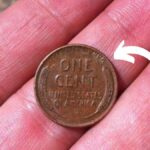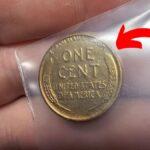The story of the Lincoln Wheat Penny represents one of the most fascinating chapters in American numismatic history. While most people wouldn’t think twice about a penny in their pocket, certain rare versions of this humble coin can be worth millions of dollars, with the most valuable example valued at an astounding $10 million.
The Birth of an American Icon
In 1909, the U.S. Mint introduced the Lincoln Wheat Penny to commemorate President Abraham Lincoln’s 100th birthday. This groundbreaking coin, designed by Victor David Brenner, made history as the first U.S. currency to feature a real person’s likeness. The design featured Lincoln’s profile on the front, while the reverse displayed two elegant wheat stalks framing the words “ONE CENT” – a tribute to America’s agricultural heritage.
The Wartime Penny That Made History
The most valuable Lincoln Wheat Penny emerged from the tumultuous years of World War II. In 1943, as the nation directed its copper resources toward the war effort, the U.S. Mint switched to producing pennies made from zinc-coated steel. However, a fascinating error occurred when a handful of copper blanks from 1942 accidentally made their way into the 1943 production line. This mistake created the legendary 1943 Copper Wheat Penny, with only 20 to 30 examples known to exist today.
What Makes It So Valuable?
The extraordinary value of the 1943 Copper Wheat Penny stems from multiple factors. Its extreme rarity, combined with its historical significance during World War II, makes it a true numismatic treasure. The coin represents a unique intersection of American history, manufacturing error, and collector appeal. The fact that it was created during a time when copper was reserved for military purposes adds an additional layer of historical importance.
Finding Hidden Treasure
The possibility that more of these rare pennies might still be in circulation keeps collectors and everyday people checking their change. While steel pennies from 1943 are relatively common, the copper versions can be identified by their distinct reddish-brown color and slightly heavier weight of 3.11 grams, compared to the steel version’s 2.7 grams.
Other Valuable Varieties
While the 1943 Copper Penny stands as the most valuable, other Lincoln Wheat Pennies command impressive prices. The 1909-S VDB, featuring the designer’s initials on the reverse, is particularly sought after due to its limited mintage of just 484,000 coins. The 1914-D and the 1922 No D (missing its Denver mint mark) are also highly prized by collectors.
The Role of Condition
For any Lincoln Wheat Penny, condition plays a crucial role in determining value. Coins in uncirculated condition, maintaining their original mint luster, are particularly valuable. Professional grading services like PCGS and NGC provide authenticated assessments that can significantly impact a coin’s market value.
A Living Connection to History
The Lincoln Wheat Penny series, produced until 1958, witnessed nearly half a century of American history. These coins passed through countless hands during the Great Depression, two World Wars, and the beginning of the Cold War. Each penny tells a story of American perseverance and ingenuity, particularly during times of national challenge.
How to Check Your Pennies
For those inspired to examine their loose change, start by checking dates and mint marks. The mint mark, if present, appears below the date. Pay special attention to pennies from key years like 1909, 1914, 1922, and especially 1943. Look for signs of double striking or other minting errors, which can add significant value.
The Modern Legacy
Even though the Wheat Penny design was replaced by the Lincoln Memorial reverse in 1959, these coins continue to captivate collectors and history enthusiasts alike. Their accessibility makes them an ideal starting point for new collectors, while the potential for discovering rare varieties maintains interest among seasoned numismatists.
Preservation and Investment
For those fortunate enough to find or own valuable Lincoln Wheat Pennies, proper preservation is crucial. Coins should be handled carefully, preferably by their edges, and stored in appropriate holders. Professional authentication is essential for any potentially valuable specimen, as counterfeits do exist.
Looking to the Future
The story of the Lincoln Wheat Penny, particularly the $10 million 1943 copper version, continues to inspire new generations of collectors. It serves as a reminder that extraordinary value can be found in seemingly ordinary objects, and that history can be preserved in the smallest denominations of our currency.
The enduring appeal of the Lincoln Wheat Penny lies not just in its potential monetary value, but in its role as a tangible connection to American history. Whether worth millions or just a cent, each Wheat Penny carries with it a story of innovation, sacrifice, and the American spirit – making it a true national treasure hiding in plain sight.







